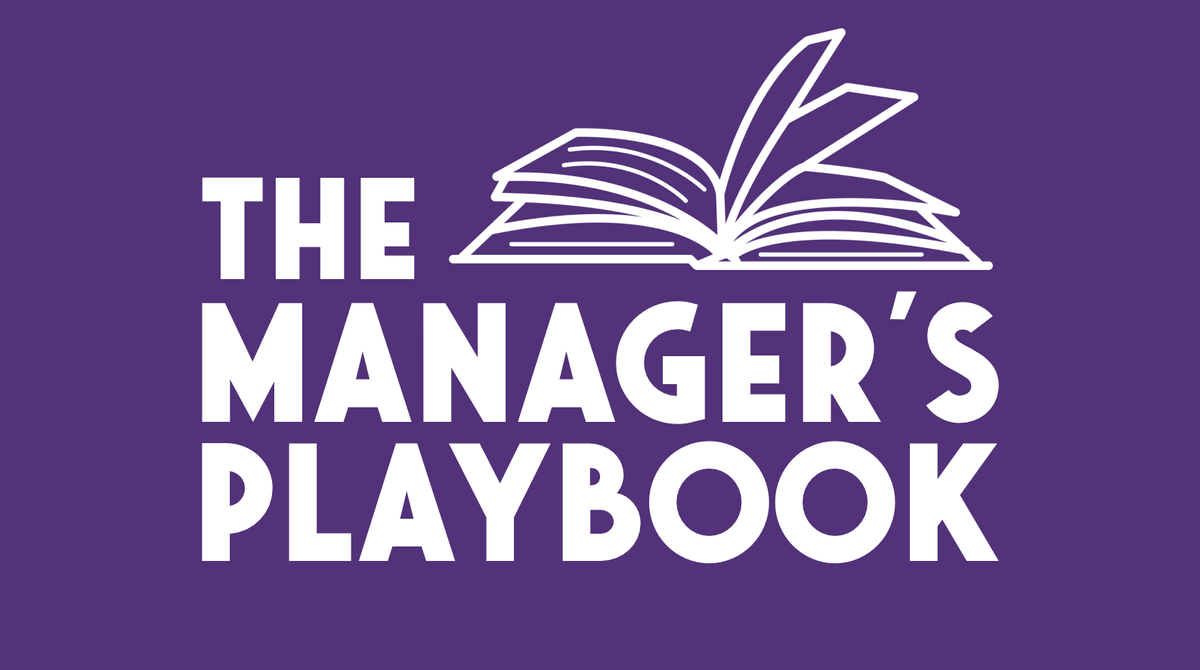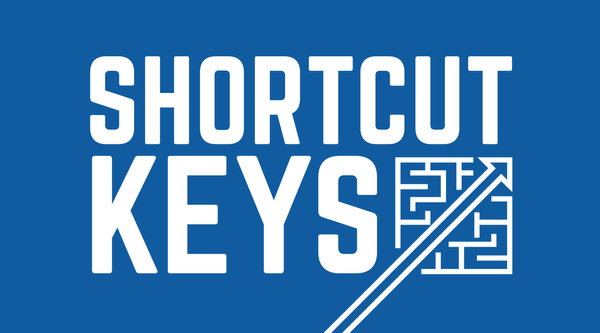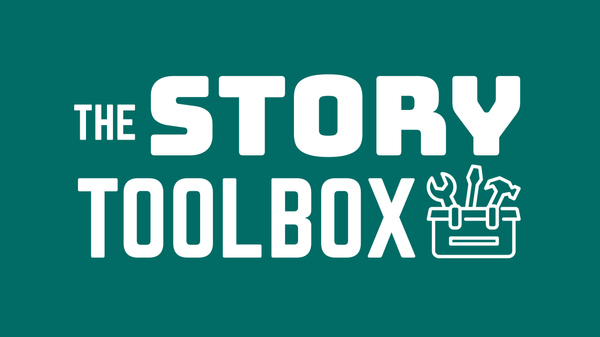The Manager's Playbook #1 - What skills do you focus on?

Welcome to the first edition of The Manager's Playbook, a recurring newsletter series on management and leadership skills.
I started managing engineers in the summer of 2015. I had just been promoted to manage a few engineers on my team after going through an internal interview process. Up until this point, I had been a backend engineer on the team, but I had gotten the promotion because I had some experience organising volunteers during events and being proactive in leading team initiatives. I knew this role would require an entire new skill set, but I was keen and interested in learning.
It was a small team, so we didn’t have any formal management training in place. Instead, my manager asked me: What training do you need? What training would you like?
I love that I was able to choose what type of training suited me best, but in retrospect I didn’t know what I needed or even what options were available.
You often don’t know what you don’t know. And those gaps are the hardest to identify and fill.
That’s why I started The Manager’s Playbook: to give you a practical guide to the skills you need, so you’re not left guessing where to start. We’ll take real-world management challenges and break them down into clear, actionable steps you can apply right away. Each edition will feature a scenario you might face as a leader and a playbook to help you navigate it. Let’s dive into our first one.
Scenario: You've just been promoted to manager
You’re stepping into your first management role. You’re excited but also unsure: What should you focus on first? You know management requires a different skill set, but where do you begin?
Step 1: Understand your role
Management varies across companies. Your responsibilities, expectations and success metrics will depend on your organisation and team. To get clarity:
- Talk to your manager about what’s expected of you in this role. What does success look like? What challenges should you anticipate? What skills do you need to handle those challenges? What skills does your manager think you should focus on?
- Look for a career progression framework. Many companies have them for managers, outlining key skills and responsibilities. If your company doesn’t, look at the career frameworks of other companies or something like progression.fyi to get inspiration.
- Observe and talk to other managers in your company. What skills do they use daily? What challenges do they navigate?
- Research what core skills are mentioned in leadership books, articles, and newsletters like these.
Even with this, you still won’t know everything upfront, and that’s okay. The key is to recognise what feels uncertain so you can start filling in the gaps and be aware that there will be areas that you’ll need to uncover and adjust along the way.
Step 2: Identify what you need to learn
Management is a different skill set from being an individual contributor. You don’t need to know everything on day one, but recognising what you need to know is the first step to learning.
Exercise: Start by making a list of the skills that will be most important in your first six months based on the research you did in Step 1.
Consider these key areas:
- 🫶 Giving feedback with empathy and candour.
- 🎢 Navigating and facilitating "difficult" conversations.
- 💖 Building trust with your team and with stakeholders.
- 💡 Coaching and developing people.
- 💻 Providing technical guidance and leadership.
- 🎉 Advocating for and celebrating your team.
- ✅ Setting clear expectations and managing performance.
Now, add any specific concerns you already have. Are there particular situations you feel unprepared for? Are there areas where you have a general sense of what is expected but not the full picture? Write those down too. You want to start uncovering those unknown unknowns and turn them into known unknowns. The goal is to start bringing hidden gaps to the surface, turning the things you haven’t even thought to ask about into questions you can explore. This means acknowledging what feels uncertain, even if it’s uncomfortable, and giving yourself permission not to have all the answers yet.
Don’t worry about answering these yet. The aim is simply to notice what’s on your mind and to document your thoughts.
Step 3: Identify the most important skills for you
Now that you’ve written down your skills and concerns, look at your list and ask yourself which of those skills are the most relevant to you.
- What skills do you need to use this week?
- Which skills feel most important right now?
- What's missing from the list?
- Are there situations coming up where you’ll need to do something you've not done often?
Not everything needs to be tackled at once. Look at your list and rank each skill on a scale of 1-3:
- 1: Urgent - you need this skill right now
- 2: Important - you’ll need it soon
- 3: Future focus - good to develop, but not pressing
Highlight or circle the top 2-3 skills that feel most urgent. This will help you focus on what’s immediately relevant rather than getting overwhelmed by everything that you could be looking at.
Step 4: Recognise the difference between knowing and doing
You may already know that skills like giving feedback or building trust are important skills for managers, but knowing something is different from having the right tools and skills, and confidently putting it into practice.
- 📚 Knowledge: Understanding why something is important.
- 🛠️ Techniques: Having the specific frameworks, tools and methods at your disposal to make the right choices in real-time.
- 🏆 Confidence: Believing that you can do it well, even when faced with difficult situations.
- 🧰 Experience: Applying these skills in real situations and learning from them.
Confidence and experience often reinforce each other, but they are distinct: confidence helps you take action, while experience deepens your practical understanding of what works and why. The focus shouldn’t just be on acquiring knowledge, but on developing confidence, gaining experience, and finding the right techniques that turn theory into practice.
Step 5: Assess where you are with each skill
Take a moment to reflect on each of the skills you've prioritised and assess where you stand in each area:
- 📚 Knowledge: Do I understand the core concepts? Do I understand the basics of how to do this?
- 🛠️ Techniques: Do I have a clear process or approach? Do I know what to say or how to react in this situation?
- 🏆 Confidence: Do I feel confident handling this in real situations? Do I feel prepared to use this skill in real-world scenarios?
- 🧰 Experience: Have I practiced this before? Have I applied it enough to know what works and what doesn’t?
Now, examine the gaps between where you are and where you want to be. Are you missing knowledge, techniques, experience, or confidence?
This will help you focus on what you need to do to put the skill into daily practice. Being honest with yourself about your strengths and weaknesses will help you focus your energy on those skills that need the most attention. The goal isn’t to be perfect. It’s to know where you stand so you can improve.
Step 6: Create an action plan
To build any skill, you need a mix of knowledge, techniques, confidence, and experience. For each skill you want to improve, outline a plan using this simple framework:
- Learn: What resource will you use?
- To increase knowledge: Read a book, take a course, or seek mentorship.
- To develop techniques: Find frameworks, tools and best practices.
- Practice: How will you apply this in real life?
- To build confidence: Look for low-stakes ways to practice, like role-playing with peers or informal feedback sessions. Every conversation, meeting, and feedback session is an opportunity to practice these skills.
- To gain experience: Apply your skills in real-life situations.
- Reflect: How will you track what’s working?
For example, if you want to get better at giving feedback:
- Learn: Read a guide on constructive feedback techniques.
- Practice: Role play a piece of feedback with a peer, and deliver that feedback in your next 1:1.
- Reflect: Write down how it went and what you’d adjust next time.
Step 7: Track your progress
Keeping track of your progress will help you stay focused and recognize your growth. Choose a simple way to log what you’re working on, what you’ve tried, and what’s helping. This could be a notebook, a document, or even a quick end-of-week reflection. The key is to notice your progress so you can build on what’s working.
Step 8: Iterate and adapt
As you continue to develop these skills, your focus will shift. Some will become second nature and part of your faily manager toolbox, allowing you to look at the next set of skills in your original list.
Set a regular check-in (perhaps every few months) to reflect on your growth and repeat this process. What’s the next skill you want to develop?
Your turn: Let’s share & learn together
So now, I’ll turn the question to you:
- If you've been managing for a while:What skills helped you most in your first few months? What do you wish you'd learned earlier? What would have made those first few months easier?
- If you're new to management: What skills are you currently working on? What do you feel unsure about?
Management can feel overwhelming at first, but you don’t have to figure it all out on your own. Learning from others’ experiences, sharing challenges, and seeking out guidance can make all the difference. If you’re feeling stuck or uncertain, know that you’re not alone: every manager starts somewhere.
When I started I knew I had a rough idea of what skills to focus on, but didn’t take time to properly understand the difference between knowledge, techniques, confidence and experience. There’s a big difference between knowing what are valuable skills, and knowing how you apply it and put in action.
I wish I had learnt more about different approaches, frameworks and methods, had been exposed to different scenarios, and had been able to compare and discuss different options. I wish I had taken more time to not just consume theory, but to practice, role play and discuss how to actually apply what I learnt to my specific contexts.
The more you practice, the more comfortable and confident you’ll become. Over time, you’ll develop your own personal management style.
In future editions of The Manager’s Playbook, we’ll focus on small, practical changes that can help you build confidence and improve your management and leadership skills. We'll look at refining how you give feedback, structuring more effective 1:1s, and handling tough conversations. The goal is to make your learning actionable and approachable.
I’d love to hear your thoughts. Hit reply or leave a comment, and let’s continue the conversation!
See you next time,
Melinda



